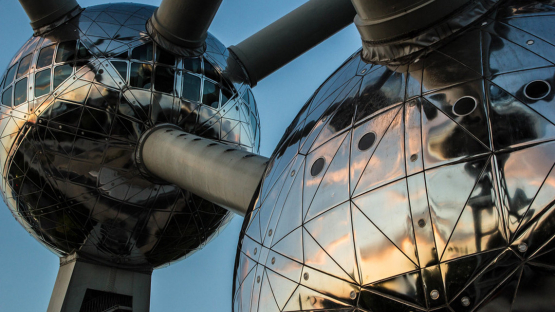IAEA Director General Rafael Mariano Grossi met with Belgian Ministers this week during his two-day trip to Brussels. Belgium, an IAEA Member State since 1958, has operated nuclear plants since 1974 and is a strong supporter of IAEA initiatives to promote the peaceful application of nuclear technology and techniques, such as those used in nuclear medicine, industry, food and agriculture, non-destructive testing of cultural artefacts, as well as in climate change mitigation and adaptation.
On Thursday morning Mr Grossi met with Belgian Prime Minister Alexander De Croo. Discussions focused on nuclear energy; nuclear non-proliferation; and the IAEA’s contribution to the global fight against cancer. Belgium is proactive in supporting the IAEA’s cancer treatment and prevention work, and in February this year announced, along with France, that it was donating funds to an IAEA initiative to advance cancer care in Niger.
Mr Grossi raised ways of increasing this commitment in the future, and shared IAEA’s plans to further develop cancer care in Africa, describing the cancer burden on low-income countries as an issue which the international community must come together to address.
Earlier this week Mr Grossi took part in Union for International Cancer Control’s World Cancer Leaders’ Summit, in which he outlined IAEA innovations in increasing access to cancer care, and the many activities the IAEA undertakes with its partners to help fight this growing disease.
On Wednesday, Mr Grossi met with Belgium’s Minister of Energy Tinne Van der Straeten, where they discussed current developments in Belgian nuclear policy and the prospects of upcoming nuclear technologies, such as small modular reactors (SMRs). Offering greater affordability, scalability and shorter construction times, SMRs are being considered by several countries, around the world as an option for providing reliable and low-carbon energy to remote and industrial areas. Mr Grossi shared how the IAEA is involved in advancing this technology, including by recently launching an Agency-wide Platform on SMRs and their Applications for countries to access IAEA support from technology development and deployment to nuclear safety, security and safeguards.
Belgium has seven nuclear power reactors in operation that generated almost 40% of the country’s electricity in 2020. In 2003 the country decided to begin phasing out nuclear power and this year will confirm whether some plants should be retained or shut down by 2025.
In a meeting with Interior Minister Annelies Verlinden, Mr Grossi also discussed ways in which the country could more fully expand its nuclear science and technology expertise to industries across its economy. They also discussed issues related to nuclear safety and security. Belgium has a robust nuclear security regime, and in 2019 an IAEA team of experts confirmed this through a nuclear security advisory mission that evaluated the country’s general legal and regulatory framework for the security of nuclear and other radioactive material.
Belgium is a strong supporter of the IAEA’s nuclear non-proliferation work and activities in applying nuclear techniques and technology in medicine, industry, and development. Earlier this month Belgium announced it was allocating EUR 1.6 million to the IAEA for the prevention of nuclear proliferation and the strengthening of civil nuclear cooperation. This voluntary contribution will see funds allocated to the IAEA’s technical cooperation programme for improving access to nuclear technologies in health, food, agriculture, environment and energy; the Agency’s Division of Human Health focusing on nuclear medicine; and towards the renovation of the IAEA’s nuclear application laboratories in Seibersdorf, Austria. Funds will also be allocated to the IAEA’s safeguards initiative ‘COMPASS’, and support the IAEA’s verification activities.






